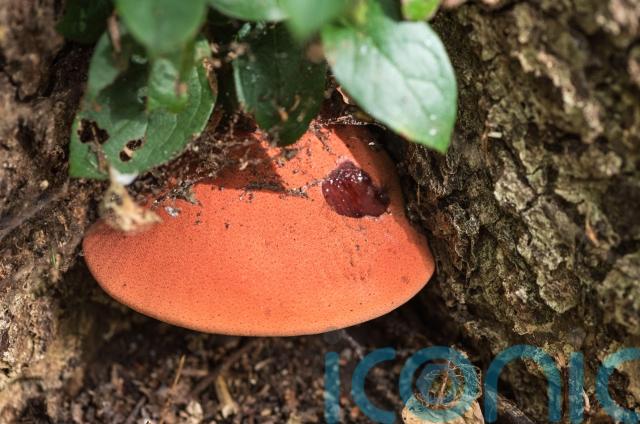
Garden experts are embracing fungi as part of a healthy garden, in a change of approach that comes amid an autumn bonanza of mushrooms.
The Royal Horticultural Society (RHS) says it is seeing record numbers of fungi at its five gardens around the country already this season, as this year’s weather has provided perfect conditions for good displays.
A sunny spring and summer benefited fungi that grow in close partnership with plants, which were able to make plenty of sugars and pass them on to their fungal partners to help them grow and reproduce, the RHS said.

And recent wet weather kickstarted growth of spongy-capped mushrooms known as “boletes”.
At the charity’s Harlow Carr garden in Yorkshire, more than 768 species of fungi have been logged, up from 570 last year.
These include rare and little known species and one found for the first time in the UK – Spiculoglea inequalis – which despite being thought to have been in the country for a long time has only just been identified due to improved understanding and interest in documenting fungi.
At RHS Garden Wisley, more than 20 native species have been hand-reared on agar, with seven propagated onto woodchips and logs to provide autumn interest and year-round food and habitat for wildlife, the charity said.
Fungi thriving at RHS gardens this autumn include beefsteak fungus, which grows on oak heartwood, looks and feels like a tongue, and when cut, oozes red juice like a rare steak.
Shaggy inkcaps, which support soils underneath grassy areas and make tall mushrooms that quickly dissolve into sticky black ink, are also doing well, the RHS said.
The horticultural charity says it has completed a “U-turn” on fungi.
Where once, they would have been discussed as symptomatic of a problem in gardens such as waterlogging or disease, fungi were now recognised as part and parcel of a healthy natural system.
Some 5% of named fungi can cause plant disease, and species play many roles in modern gardens, from breaking down dead and decaying material and nourishing plants and animals to helping hold water in the soil in drought and maintaining soil structure in heavy rain, the charity said.
The RHS said it was encouraging fungi across its own sites and in its advice to gardeners, and has published a new book – RHS Fungi For Gardeners: Know Your Garden Fungi And How To Grow Them, by Jassy Drakulic – to encourage green-fingered householders to see them in a new light.
Dr Drakulic, plant pathologist at the RHS, said: “Fungi have long stood in the shadow of plants but we’re now starting to consider them as fundamental to a fully functioning garden ecosystem.
“There is much more to understand about fungi but with more effort to support and study them, we can discover how to work with them to get the best from our gardens.”
Subscribe or register today to discover more from DonegalLive.ie
Buy the e-paper of the Donegal Democrat, Donegal People's Press, Donegal Post and Inish Times here for instant access to Donegal's premier news titles.
Keep up with the latest news from Donegal with our daily newsletter featuring the most important stories of the day delivered to your inbox every evening at 5pm.